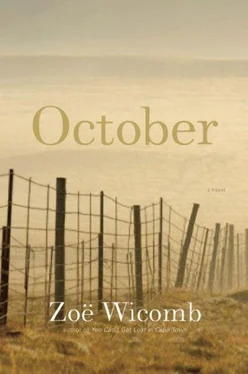Nicholas shook his head sadly. Who could have imagined such an abomination, such a disgrace? He was glad that Nettie was snugly in her grave. Nettie would know that he had done his best for the boy, that he was blameless, that in spite of regular chastising, the feckless Namaqua ways had infected the boy.
Now Nicholas is dead. Did her father die of a broken heart? Was that what his heart failure was about? Has he been killed by Jake’s outrageous behavior? Had Jake found some choice words with which to strike a fatal blow? That, Mercia assumes, is what Sylvie means. If only she had been there to protect him, an old man who, having done his best, had to live with the disappointment of contrary children. Mercia sighs. Well, nowadays people know the risks involved in reproducing themselves. That the clone they hope for and groom may well turn into a viper. At least, Mercia has always assumed that that is what her own womb would produce.
It is more difficult than Mercia had thought, trying to work on her book, wading through the cant that clings to local versions of postcolonial memory, whilst waiting for Jake to rouse himself. Does she imagine that he will one morning rise and shine and over a cup of freshly brewed coffee discuss his condition or Nicky’s plight with her? She chooses not to think that far ahead. But by midafternoon Mercia has had enough. She is bored with her summaries of existing arguments. The promise of new insights darts about, as elusive as the floaters that here, in the October light, assail her vision. So much for being home, where her eyes can no longer manage the moderate brightness of spring. Perhaps like grief these symptoms that appear one by one will pass, at least the ones that matter.
With little else to do in that place, the memoir presents itself as an option. In Nicky’s little room, behind closed doors, she opens the file, flicks through the fragments. Mercia tries to persuade herself that the memoir, so much easier than critical writing, will fill the afternoon hours. As if she does not know better. As if she needs to see the cursor’s tireless flicker at the start of a new blank document to know that no words, by virtue of being about real people and events, exist ready-made for committing to the screen. The words that have to be processed are yet to be found, retrieved from the teeming jumble, the cacophony that carries on in her head. How tired she is of this conundrum, of the unfound words that have fallen to her for processing. Tired too of the long imaginary discussions with Craig, the abject what-went-wrongs, and of Jake and the childhood he cannot throw off. Is she not also tired of the very living she makes, a profession bristling with words that generate more words? With more than enough words in the world, with the many commentaries on commentaries, the stories echoing each other, why the temptation to write another, to reproduce?
No, she must keep things in perspective. Writing about the dreariness of their lives in Kliprand would be, as she well knows, a redundant act. There is nothing extraordinary about the Murrays; in fact, are there any stories in the world that do not have a counterpart in another culture, that with a small measure of imagination are not easily transposed? Oh, she knows that this harks back to the now discredited notion of universality, but what to do, what to do when Jake, as wayward as he is in real life, won’t be pinned down? Mercia closes the screen. It is a diversion from her work. She is a teacher and a critic, and that ought to do. If she is tired and despondent, unable to progress on her project, that too is a given; it is the condition of people in her profession.
The little room closes in on her. It is too hot to go out for a walk, and Mercia cannot face the possibility of meeting Sylvie on the stoep or in the garden. If only she had brought along the novel about siblings who return to the place of birth. These days her memory is not what it was; already she could do with rereading the story she remembers as a version of theirs, echoed in another continent. Give or take a few transpositions, the different worlds are not so different, in spite of the genteel northern setting. Mercia having then settled into identification with the story, the characters — a child with a dressing-up box — wonders what it would be like reading the novel now, at home, where she grapples with being back. Although, being here in Kliprand is simply a question of a couple of weeks; bunking down boots and all is not an option. Besides, it is too late. Her father is dead.
Return has always been a tricky notion, teeming with thorns. Why, people often ask, has she not returned to the country after Mandela’s release? She would shake her head, shrug, would not deign to answer. As if exile were a frozen affair in which you are kept pristinely in the past, one that a swift thaw could restore so that, rinsed and refreshed, you are returned in mint condition to an original time, an original place. Nowadays Mercia does not want to think about Craig’s role in her condition, about how different things might have been had she not been enthralled by him.

If Kliprand is not home to Nicholas, it cannot be home to his children. They were born there, raised in Namaqualand, but no, they should not think of it as home. Physical geography is not everything; it is important, in the interest of self-improvement, to dispense with the notion of home. It is after all an excessive sense of belonging that leaves the people of Kliprand tied to the place, limited and ambitionless, bound by their past and its unspeakable customs. But they do not have the means to go elsewhere, the children protest on behalf of the people. Nicholas counters with the fact that as a young man he did not have the means to leave the Overberg. Only think of our forebears, he says, the adventurous Scots who left their home and braved the seas to make new lives at the Cape, or the Moravians who founded the mission station at Elim — there are examples of developed minds who were able to shrug off the outmoded, atavistic notion of home, way back in the nineteenth century. Thus his children should not think of this place of their birth, burdened as it is with the arcane complexities of belonging, as their home.
Instead, belonging is a given; it may be about the space where they live, but the self could belong any place at all where improvement presents itself. Belonging is sanctified not by place, but by blood relations, family. For the children, family is an idea imagined by their parents, bound up with the smell of yeast wafting from Nettie’s baking, the curling wood smoke, the anticipation of warm brown bread on which her freshly churned butter will melt, and the prayer of thanks to God as they gather to eat. The grown-ups have no idea how oppressive the children find that family, that home. Nicholas has no idea how much Jake hates him, what he would give to be in the city where an odorless Duens loaf could be bought from the corner shop.
In Cape Town there are more Murrays, respectable brothers and sisters who have married well, which is to say spouses with good hair. If Nicholas’s children long for company, for playmates, well there are cousins with whom they could correspond. The fact is that the children here in Kliprand do not wash their hands, he explains.
South Africa itself is a model, Nicholas claims. We can’t think of this country as ours, because it belongs to white people, even to the English who claim to belong to Europe. Colored people can’t support the Springboks; no, when we sit with our ears glued to the radio, it’s the Lions or the All Blacks whom we cheer. So we are free, above geography. We’re free to belong anywhere.
Читать дальше













